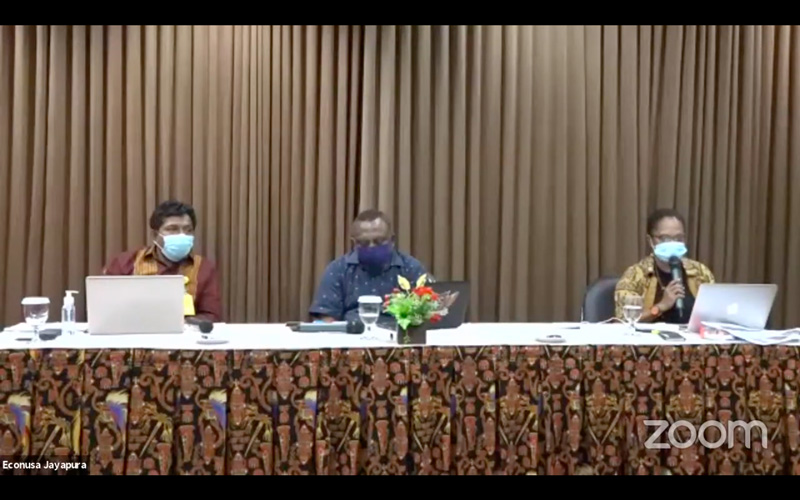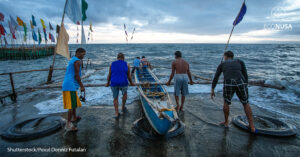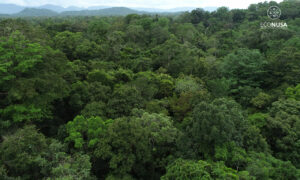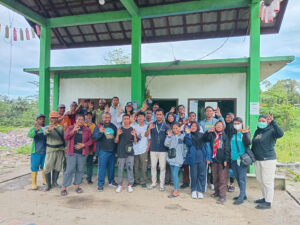
Restoration of mangrove ecosystem in Youtefa Bay, Jayapura City, Papua Province, is urgent. Infrastructure development has degraded ecosystem and downsized the mangrove forest areas. Whereas, mangrove in Youtefa has closely linked with the community traditionally and economically.
Academician of Cenderawasih University, John D. Kalor, said mangrove forest areas in Youtefa Bay has been significantly reduced. In 2018 measuring, mangrove forest in Youtefa was 233.12 hectares. The figure has declined by more or less 50 percent as from 514.24 hectares, the size in 1967.
Despite its status as protected forest areas, there are illegal building on Youtefa coastline. Worse, the construction of rowing arena to gear the National Sport (PON) event in 2021 has also degraded the mangrove forests. Mangrove, sago, pine and pandanus have gone by the pile of coral.
The changing ecosystem of Youtefa Bay happens due to the 3-meter deep dredging for the rowing track. As to John, the dredging activity makes the water dirty and affect the oxygen supply in water. The condition influences the lives of fish, sea biota and might jeopardize the coral reef.
“Mangrove ecosystem at Jayapura coastline is found at Youtefa and Demta Bays. But the most severe damage and contamination of mangrove ecosystem happens at Youtefa. There should be urgent measure to recover it,” said John in a virtual discussion entitled “Mangrove Forest at Youtefa Bay Free from Plastic Waste” on Saturday, 7 November 2020.
Mangrove ecosystem at Youtefa Bay consists of 10 mangrove species, 6 species of Bivalvia, and Gastropoda species. The ecosystem biodiversity might lose due to pollution. Research done by Thomas Kaleb Tampewama found that heavy metal lead (Pb) with high concentration at some spots of mangrove forest. Lead is toxic to human and water organism.
“Lead causes health problem to human body due to excessive toxin. Lead affects the reproductive capacity of water organism and human. Hasmi’s research found that lead has contaminated some Bivalvia and Gastropoda species that have been consumed by Youtefa community, “ said John.
Port Numbay Young Customary figure, Rudi Mebri, said that mangrove forest at Youtefa Bay has cultural, social and economic values to the community. The cultural value transfer at mangrove forests at Enggros Village known as Women Forests. Women there teach cultural values to girls of 12-17 years of age while seeking bia (oyster), crab and shrimp.
Unfortunately, single-used plastic waste has slipped into the roots of mangrove and thus pollute the Women Forests. Worse still, degradation also happened due to the construction of rowing arena. Oyster, crab and shrimp are getting hard to find. The women might lose customary assembly spot (para-para), a special spot for women to discuss many issues.
“Mangrove forest or Women Forest is the customary assembly spot. Forests (of mangrove) are continuously contaminated by plastic waste. When we fail to protect mangrove, how we could sustain our culture,” said Rudi.
To reduce the ecosystem degradation at Youtefa Bay, Rudi and other local youngsters created Port Numbay Green Forum. The forum serves as an initial step to seek permit to an ondoafi (customary leader). Having attained the permit, the Port Numbay Green Forum could help clean the Women Forests which is prohibited for men.
Meanwhile, John applies an educative approach to elementary students. As to him, they are all vital partners as supporter team for mangrove ecosystem. He expected they could act as the campaigner for mangrove ecosystem conservation in the future.
Editor: Leo Wahyudi dan V. Arnila Wulandani




